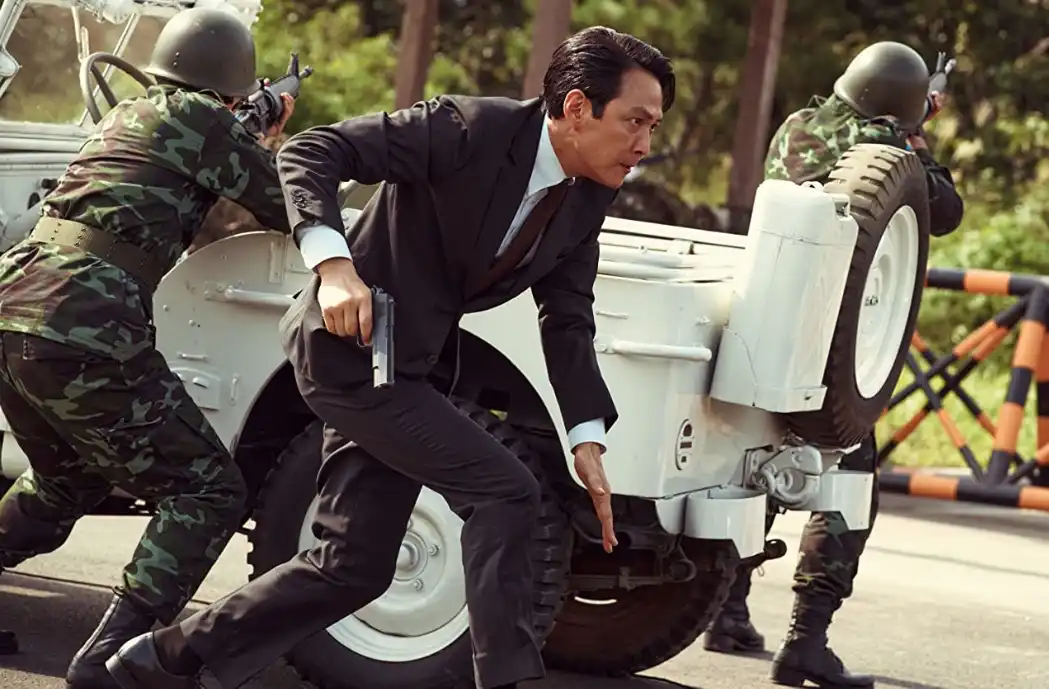
Film Review: Hunt
Film Reviews
Hunt
Director: Lee Jung-jae
Artist Studio & Sanai Pictures
In Theaters: 12.2.22
Squid Game star Lee Jung-jae’s directorial debut and action-packed spy flick, Hunt (starring Lee himself), begs history buffs to give it the love only they could provide. While the characters are fictional and the events portrayed in Hunt never actually occurred, the film follows government officials in the early 1980s in South Korea and requires some understanding of the period. Regardless, all (well, maybe most) of the dots connect for all audiences eventually as gunshots, interrogations and quick cuts take over the screen for the full two hours.
Despite many subplots, the center-stage concept is the “hunt” within South Korea’s National Intelligence Service for a North Korean spy who’s attempting to assassinate South Korea’s president. Hoping to educate younger audiences and international viewers, Hunt deals with the violence, student protests and multifaceted politics swarming the streets of 1980s South Korea. Lee told Yonhap News Agency that, after premiering at Cannes Film Festival, 30% of international critics complained about the difficulty in understanding the story. As an American viewer, I found myself coming to the same conclusion.
My mind ping-ponged from bad guy to good guy as I watched men in well-tailored suits interrogate each other, break the arms of enemies and fire machine guns at crowds. Just when I thought I may have it all straight, I’d lose myself in a subplot and a cloud of confusion. While the story’s nuance may elude the uneducated, any audience will be fully invested by the third act. Hunt’s suspense, dramatic blue lighting and supersonic speed make the film worth enduring any lingering perplexity.
While Hunt’s intentions are well-founded, it lacks a sense of focus. I can not fully grapple with its contents to the fullest extent, but it also struggles to follow a steady plot. Hunt’s greatest strength was almost anything aside from its writing: action sequences, an energized score, articulate choreography and production design. The film attempted to reveal plot twist after plot twist, so once it finally came down to an ultimate turn of events, it was underwhelming. The flow of the script from scene to scene is too dense, which results in a pacing issue—If only Hunt reeled itself in a bit more, it could have flourished.
Bouncing from an anecdote about Park’s adoptive daughter Jo Yoo-jeong (Go Yoon Jung) to a rivalry between Park and agent Kim Jung-d0 (Jung Woo-sung), confusion is feasible for any viewer. There is a lack of character development, making it difficult to follow our protagonist or his relationships. While Lee gives a superb performance, his character is hard to relate to, and his motives are hard to understand. Hunt frequently leans on flashbacks, so even when it attempts to reveal emotion or a backstory, it ultimately contributes to a heap of confusion. Additionally, much like Once Upon A Time In Hollywood, Hunt follows real events with new characters or alternative affairs, which could work if the film dialed back in other areas, but instead it just makes it all too convoluted.
Aside from the aforementioned entertainment value through editing and flashy action scenes glued together with vast amounts of violence, its sub-par writing and development left me slightly unsatisfied, yearning for more clarity and structure. It is possible my conclusion is influenced by the fact that most Korean media I have consumed has been top-of-the-charts, award-winning television and film (Squid Game, Parasite) and am not fully versed in Korean film techniques. However, I believe Hunt could be inspired by some Western directors, with its action violence, dim lighting and high-speed chases reminding me most of Christopher Nolan flicks. Hunt is a suspenseful fiasco that you can’t look away from, and while I wouldn’t add it to a Letterboxd list of films to recommend, Lee builds a directorial foundation that gives me hope for another film that will surpass Hunt’s mediocrity. –Birdy Francis
Read more reviews of Korean-language films:
Film Review: Minari
Film Review: Broker